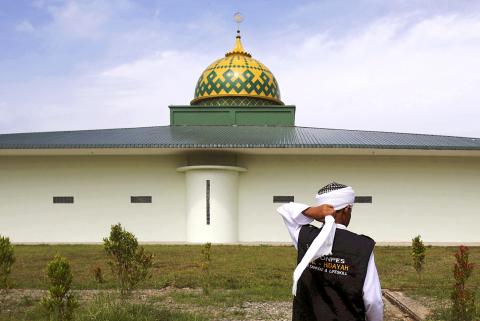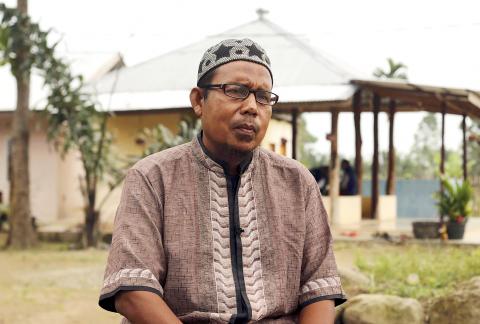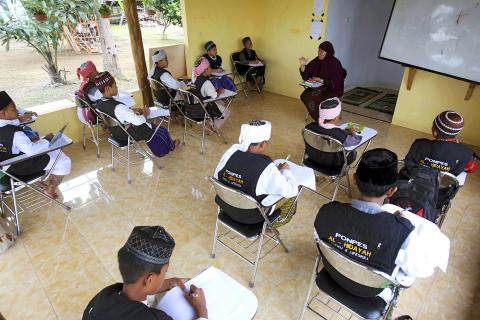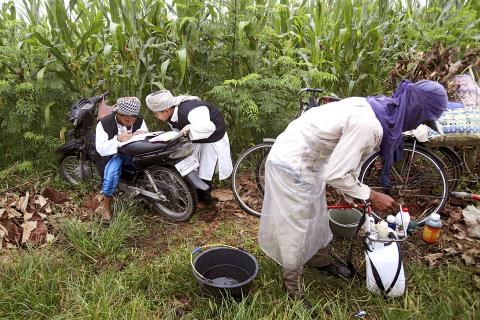The slim boys in Muslim caps and robes at the Al Hidayah Islamic boarding school are grinning bolts of energy who love football, need a little coaxing to do their math and Koran lessons assiduously and aspire to become policemen or respected preachers.
Their school, like many in rural Indonesia, started as a modest affair with a dusty yard, spartan sleeping quarters and an open-air classroom with a dirt floor and corrugated iron roofing. The boys, though, have been spoken to roughly by villagers, the school’s banners and billboards trampled and burned, and its head teacher reported to police.
The 20 pupils are the sons of Islamic militants, reviled by most Indonesians for killings and other acts of violence that they justified with distorted interpretations of Islam. Nearly half of the boys’ fathers were killed in police raids, and in some cases the children witnessed the deaths. Most of the other fathers are in prison for terrorism offenses.

Photo: AP
Al Hidayah’s founder, Khairul Ghazali, is a former radical preacher whose involvement in militancy stretches back decades. He was recruited at age 19 by Abdullah Sungkar, the now-deceased leader of the Jemaah Islamiyah terror group responsible for attacks including the 2002 Bali bombings that killed more than 200 people.
CHANGED MAN
Nowadays, the soft-spoken Ghazali, 52, professes to be a changed man who wants to atone by preventing his young charges, who were ostracized and taunted at mainstream schools, from becoming the next generation of Indonesian jihadists. His three sons attend the school.

Photo: AP
A turning point, he said, came in 2010 when anti-terror police raided his home in North Sumatra and shot dead two other militants, wanted for killing police officers, in front of him, his wife and children. In prison, he dwelt on his decades of jihad and in the hours spent poring over the Koran found his past wanting. With the encouragement of prison officials, he wrote several books against radicalism, earning the enmity of other jihadists who denounced him as an infidel who deserves death.
“It’s hurt our innocent children. It’s hurt us,” said Ghazali, who was released in 2015 after serving four years for offenses that included a major bank robbery to fund attacks. “Stigmatization, poverty and the fact that many innocent people were killed and the destruction we caused all accumulated into an inner torment.”
Ghazali’s school in North Sumatra is supported by counterterrorism officials but is only a small dent in a largely undiscussed problem. By his reckoning, there are at least 2,000 sons and daughters of killed and imprisoned militants at risk of becoming battle fodder for a new wave of jihadism.

Photo: AP
Indonesia has had successes in rooting out violent militants but officials acknowledge risks remain. A 2015 Pew survey of Indonesians showed that 4 percent, or about 10 million people, had a favorable attitude toward the Islamic State group. A survey by Saiful Mujani Research and Consulting in May this year showed 9 percent support Indonesia, the world’s most populous Muslim nation, changing from a secular to an Islamic state. A few Islamic boarding schools churn out students susceptible to violent radicalization.
The IS group’s declaration of a caliphate over swaths of territory it temporarily held in Iraq and Syria, and more recently the occupation of the southern Philippine city of Marawi by IS sympathizers, has provided a psychological boost to militant networks in Indonesia that had been atomized by a sustained crackdown. As the group’s territory in the Middle East shrinks, officials fear Indonesians who fought there, or in Marawi, will return to Indonesia and provide leadership and skills that could help produce more lethal attacks.
RELIGION OF LOVE AND MERCY

Photo: AP
Sitting in a classroom just after dawn with students whose ages range from 9 to 15, Ghazali tells them stories about the life of the Prophet Muhammad to show them, he said, that Islam is a religion of love and mercy, not an ideology to justify a war against police, currently the most frequent target of militant attacks in Indonesia.
Abdullah, 13, and his two younger brothers were sent by their mother to Ghazali’s boarding school last year because of the hostility they faced at their regular school.
“I can’t stand the taunts at school,” he said, his lips trembling. “I dropped out when I was in the third grade and I had to move from place to place. I was insulted as a terrorist kid when my father was in prison. I was so sad.”
Abdullah said his favorite activities at school are football and Arabic lessons. He aspires to become an Islamic teacher because “there are many people who claim to know Islam but actually they don’t know what Islam is and how to practice it.”
The initial hostility the school faced when it opened in 2015 has faded. Local police talked to villagers, raising awareness about its purpose. A stream of officials from the district and provincial governments and the military visited to show their support.
Villager Hendra Widiarto, who lives about 300 meters from the school, said lack of information about it and its makeshift appearance made locals suspicious, and they became confrontational when they learned about the backgrounds of Ghazali and the students.
Nowadays, Widiarto, a carpenter, helps Ghazali make cabinets and bookshelves for the school. Every Friday, people from surrounding villages and students from government schools come to Al Hidayah to pray.
“If ever possible, I want my own two children to learn morals and discipline at this school,” he said.
VICTIMS OF IDEOLOGY
At the request of the National Agency for Counter-Terrorism, the local government last year provided 30 hectares of land next to the school and agency’s chief collected donations from companies and businessmen that allowed a substantial mosque and two sturdy classrooms, painted lime green, for up to 60 students to be built. The original open-air classroom now has a tiled floor and construction of better living quarters will start next month; Ghazali said that will allow the boarding school to also accept the daughters of militants and kids with ordinary backgrounds.
Another school that can cater to 100 students has been set up with the counterterrorism agency’s assistance in Lamongan, the East Java hometown of three brothers who assembled a massive bomb used in the 2002 Bali attack.
“These children are victims of their parents’ wrong ideology,” said Suhardi Alius, chief of the counterterrorism agency, who wants schools for children of jihadists to be established in areas known as hotbeds of Islamic militancy such as Poso in Sulawesi and Bima in West Nusa Tenggara. “If these children are not rescued they will follow what their parents did,” Alius said, citing the example of the 19-year-old son of executed Bali bomber Imam Samudra who police say was killed in a battle in Syria in 2015.
Alius describes Ghazali as “totally changed” and taking the right course by drawing on his experience to prevent others from taking up violence.
“The state should support him because people become radical not within a day or two, but it takes a long process, so to deradicalize them we also need a long process,” he said. Six teachers from provincial schools are voluntarily helping Ghazali and his wife teach the standard national curriculum plus religious studies, Arabic and farming at Al Hidayah.
One of them, Muhammad Haris Iskandar, 51, a math teacher and vice director at a public school in Medan, Indonesia’s third-largest city, said he left his formal job because of the rare challenge offered by Al Hidayah.
“This school is very special for me,” he said.
He and the other volunteers are not only educators and motivators, but also healers and role models for children traumatized by their family’s radicalism and society’s reaction to it, Iskandar said.
The teachers also need to be combative and argue persuasively, he said, because the students sometimes doubt what they are taught about Islam when they compare it with what they absorbed from their parents. For example, he said, they have questioned why non-Muslims should not be regarded as infidels who can be killed.
Dimas, 14, said he regrets the crimes of his father, who was arrested in 2014 for trafficking drugs to fund extremism and is serving a 10-year prison sentence.
“I study here because I want to repent as my father was a criminal,” said the teen, who dreams about becoming a policeman and arresting drug traffickers.
“Many people say that my father likes to hit people and is a murderer,” he said. “I don’t understand why he should kill people.”

US President Donald Trump may have hoped for an impromptu talk with his old friend Kim Jong-un during a recent trip to Asia, but analysts say the increasingly emboldened North Korean despot had few good reasons to join the photo-op. Trump sent repeated overtures to Kim during his barnstorming tour of Asia, saying he was “100 percent” open to a meeting and even bucking decades of US policy by conceding that North Korea was “sort of a nuclear power.” But Pyongyang kept mum on the invitation, instead firing off missiles and sending its foreign minister to Russia and Belarus, with whom it

When Taiwan was battered by storms this summer, the only crumb of comfort I could take was knowing that some advice I’d drafted several weeks earlier had been correct. Regarding the Southern Cross-Island Highway (南橫公路), a spectacular high-elevation route connecting Taiwan’s southwest with the country’s southeast, I’d written: “The precarious existence of this road cannot be overstated; those hoping to drive or ride all the way across should have a backup plan.” As this article was going to press, the middle section of the highway, between Meishankou (梅山口) in Kaohsiung and Siangyang (向陽) in Taitung County, was still closed to outsiders

Many people noticed the flood of pro-China propaganda across a number of venues in recent weeks that looks like a coordinated assault on US Taiwan policy. It does look like an effort intended to influence the US before the meeting between US President Donald Trump and Chinese dictator Xi Jinping (習近平) over the weekend. Jennifer Kavanagh’s piece in the New York Times in September appears to be the opening strike of the current campaign. She followed up last week in the Lowy Interpreter, blaming the US for causing the PRC to escalate in the Philippines and Taiwan, saying that as

The Chinese Communist Party (CCP) has a dystopian, radical and dangerous conception of itself. Few are aware of this very fundamental difference between how they view power and how the rest of the world does. Even those of us who have lived in China sometimes fall back into the trap of viewing it through the lens of the power relationships common throughout the rest of the world, instead of understanding the CCP as it conceives of itself. Broadly speaking, the concepts of the people, race, culture, civilization, nation, government and religion are separate, though often overlapping and intertwined. A government